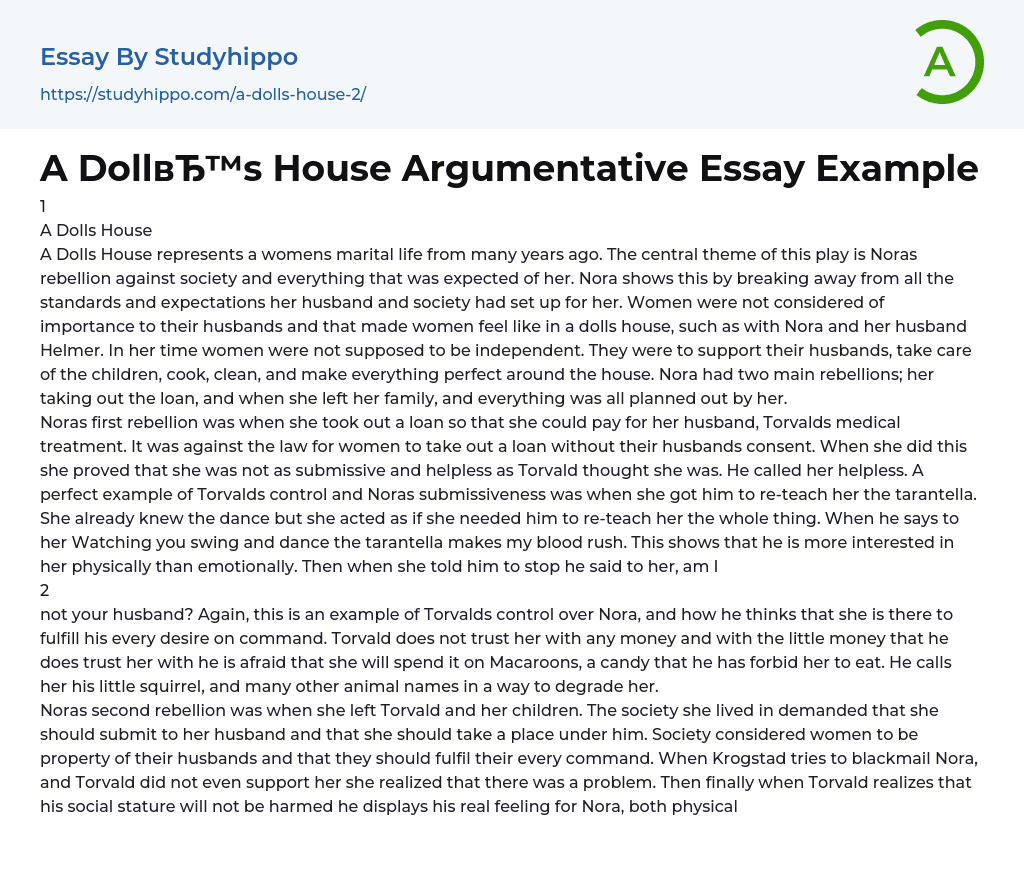The play A Doll's House depicts the lives of women in the past, particularly Nora's resistance against societal norms and expectations. Nora challenges these standards by breaking free from her husband and society's imposed limitations. In a society where husbands undervalued their wives, women often felt trapped like Nora with Helmer. Women were discouraged from being independent during that time and were expected to support their husbands, take care of children, manage household chores, and maintain an ideal home environment. Nora rebelled against these expectations through two significant actions: acquiring a loan and leaving her family, both carefully planned by her.
Nora's initial act of defiance occurred when she obtained a loan to finance Torvald's medical treatment. According to the law at that time, women were not allowed to acquire loans without thei
...r husbands' consent. By defying this restriction, Nora proved herself to be more assertive and capable than Torvald perceived her to be. Torvald had always seen her as dependent on him; for example, he insisted on re-teaching her the tarantella dance even though she already knew it well. This incident highlights Torvald's control over Nora and her apparent compliance towards him. When Torvald expresses his excitement at watching Nora dance the tarantella, it becomes clear that his interest in her is more physical than emotionalNora pleads for him to cease, yet he defends his actions by reminding her that he is her spouse, asserting his dominance over her and expecting her compliance. Torvald's lack of trust in Nora is evident through his refusal to give her any money, fearing she will spend even the slightest amount on forbidden macaroons. He further degrades her by
referring to her as his "little squirrel" and employing other animalistic names. Nora's second act of rebellion occurs when she departs from Torvald and their children, defying society's expectations for women to submit to their husbands and play a subordinate role. In this particular society, women are deemed as possessions of their husbands and are obligated to obey every command. When Krogstad attempts to blackmail Nora and Torvald fails to support her, she realizes there is an issue at hand. Eventually, when Torvald comprehends that his social standing will not be affected, he reveals both physical and emotional affection towards Nora. It is during this moment that Nora decides she no longer desires to be controlled by him and informs him of her intention to leave him. By departing from Torvald, not only does she shut him out but also leaves behind her entire past life. When Torvald attempts reconciliation with Nora, she clarifies that throughout their relationship she has been treated like a child without the opportunity to make decisions for herself. The text emphasizes Nora's longing for independence as a responsible adult capable of leading her own life.The text highlights Nora's deliberate and carefully planned rebellions against societal expectations, which the author uses to depict the norms of society during that time period. Despite facing disapproval from society, Nora felt compelled to forge her husband's signature in order to save his life, driven by love and compassion. However, both Torvald and society condemned her actions. Throughout the play, Nora is consistently belittled and treated as Torvald's possession for display purposes and fulfilling his desires. In society's eyes, Torvald is seen as the provider
and decision-maker in their relationship. This type of marriage may have been considered ideal at that time but lacked love and understanding. This becomes evident when Torvald becomes angry upon discovering Nora took out the loan to save his life. Ibsen uses Nora's acts of rebellion to expose the unrealistic demands placed on women in marriage and propose a need for a more balanced, loving, and understanding relationship between Torvald and Nora.
- Values of Life essays
- Ethical dilemma essays
- Normative Ethics essays
- Virtue Ethics essays
- Belief essays
- Deontology essays
- Moral essays
- Virtue essays
- Work Ethic essays
- Cleaning essays
- Acceptance essays
- Age Of Enlightenment essays
- Child Observation essays
- Confucianism essays
- Conscience essays
- Critical Reflection essays
- Destiny essays
- Determinism essays
- Empiricism essays
- Environmentalism essays
- Epistemology essays
- Ethics essays
- Ethos essays
- Existence essays
- Existentialism essays
- Fate essays
- Free Will essays
- Functionalism essays
- Future essays
- Good And Evil essays
- Human Nature essays
- Individualism essays
- Meaning Of Life essays
- Metaphysics essays
- Natural Law essays
- Personal Philosophy essays
- Philosophers essays
- Philosophy Of Life essays
- Political Philosophy essays
- Pragmatism essays
- Reality essays
- Relativism essays
- Teaching Philosophy essays
- Time essays
- Transcendentalism essays
- Truth essays
- Utilitarianism essays
- Adaptation essays
- Adventure essays
- Adversity essays




